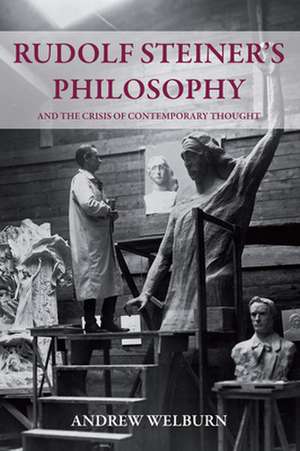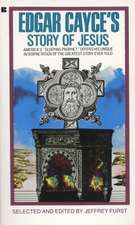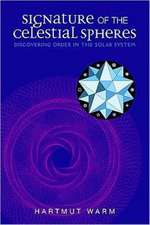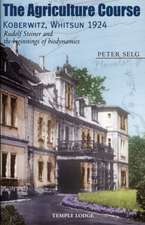Rudolf Steiner's Philosophy and the Crisis of Contemporary Thought: The Order of Birth in the Family
Autor Andrew J. Welburnen Limba Engleză Paperback – 6 iul 2011
Preț: 263.37 lei
Nou
Puncte Express: 395
Preț estimativ în valută:
50.40€ • 53.89$ • 42.02£
50.40€ • 53.89$ • 42.02£
Carte disponibilă
Livrare economică 28 martie-11 aprilie
Preluare comenzi: 021 569.72.76
Specificații
ISBN-13: 9780863158568
ISBN-10: 0863158560
Pagini: 286
Dimensiuni: 155 x 231 x 18 mm
Greutate: 0.45 kg
Editura: Floris Books
ISBN-10: 0863158560
Pagini: 286
Dimensiuni: 155 x 231 x 18 mm
Greutate: 0.45 kg
Editura: Floris Books
Notă biografică
Andrew Welburn taught at the University of London, has been a Fellow of the Warburg Institute and taught at New College, Oxford, until 2005. He is author of The Beginnings of Christianity, and Gnosis: The Mysteries and Christianity.
Recenzii
'This is a valuable book, not just for persons interested in the thought of Rudolf Steiner. It is valuable as well for anyone seeking to find a way forward amidst the shattered fragments of the modern worldview. Uncannily, according to Welburn's account, Steiner anticipated the crisis associated with post-modernity we have been facing and proposed an innovative, constructive way forward.' -- Dale Cannon, Appraisal: the Journal of the Society for Post-Critical and Personalist Studies, March 2005 'Armchair philosophers will enjoy reading this with nothing stronger than a mild herb tea to keep them awake. What really makes this book relevant and exciting is its subject. Much of this book is about knowledge, what it is, how we achieve it and above all, how knowledge acquires meaning. This book is an excellent guide.' -- Martyn Rawson, Steiner Education, June 2004 'It would be useful to have a new edition of Steiner's The Philosophy of Freedom set in the context of contemporary philosophy. Until that happens, Welburn's contribution provides an excellent alternative. [...] Welburn covers the whole breadth of Steiner's philosophical thinking and in doing so relates it to contemporary philosophy and ethics, including the work of several philosophers alive today. I was favourably impressed by how naturally the author leads the reader, almost unawares, over the boundary from philosophy to anthroposophy and the occult. [...] Should interest scientists as well as those more generally interested in Steiner's thinking.' David Heaf, New View, Spring 2004












